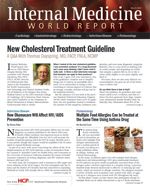Publication
Article
Internal Medicine World Report
Multiple Food Allergies Can be Treated at the Same Time Using Asthma Drug
Author(s):
Researchers concluded the asthma drug omalizumab can be used to successfully desensitize patients with multiple food allergies

The asthma drug Xolair (omalizumab) was successfully used to desensitize patients with multiple food allergies simultaneously over a median period of 18 weeks, according to a study published online in Allergy, Asthma, and Clinical Immunology.
In the study, 25 patients aged 4-46 with multiple food allergies underwent oral immunotherapy (OIT) plus omalizumab treatment. In OIT, patients are given small yet gradually increased doses of the allergen under a doctor’s supervision in a hospital setting. A previous Stanford study showed omalizumab is effective in reducing IgE molecules, which are involved in allergic reactions. The allergens included a variety of foods, such as peanuts, nuts, sesame seed, dairy, or eggs, and up to 5 allergens were treated with OIT throughout the study.
“In this phase 1 study, we have shown that participants allergic to multiple foods can be safely desensitized to up to 5 foods simultaneously using a modified OIT protocol,” the authors wrote. Excluding 3 participants who withdrew due to eczema flares or dropped out, every patient reached a 10-fold increase in their allergic reaction threshold during the study period. In previous studies that did not include omalizumab, it took patients 85 weeks to become desensitized to their allergens, but in this study, single allergen OIT participants were desensitized 14 weeks earlier than their multi-allergen counterparts.
There was a bystander effect of the study that the researchers did not anticipate, as they found that 60% of the patients were desensitized to related allergens at the conclusion of the study. For example, a patient who was allergic and desensitized to pecans also became desensitized to walnuts.
“In the future, we’ll be trying to understand why some people have the bystander effect during clinical trials and some don’t,” Kari Nadeau, MD, PhD, associate professor of pediatrics at the Stanford University School of Medicine, said in statement.






